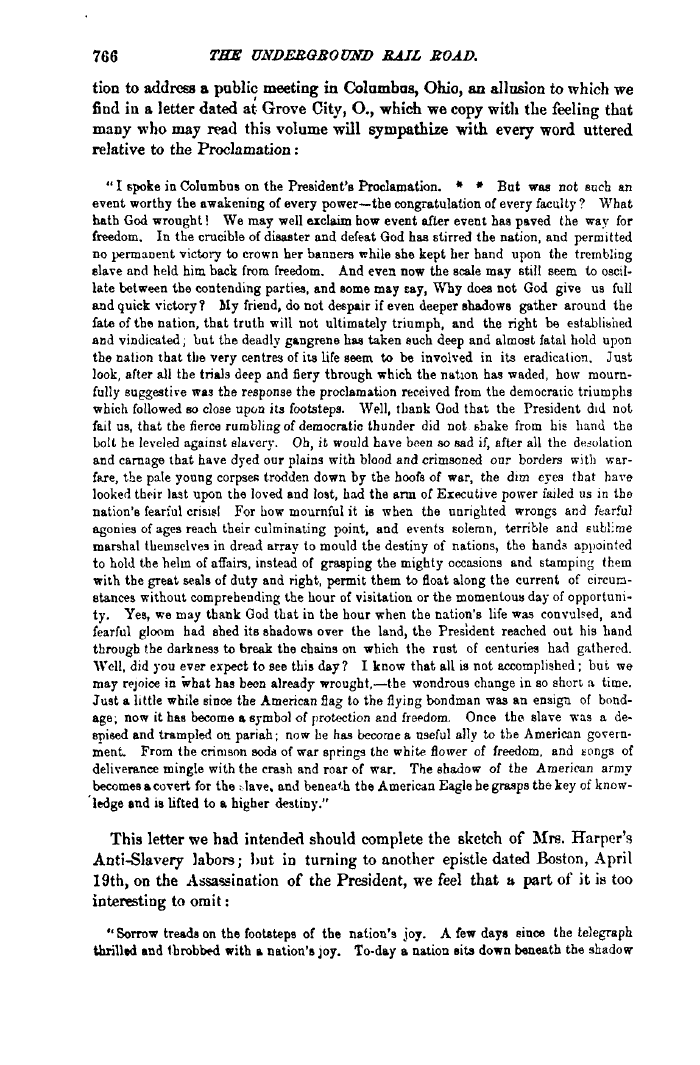 |
||||
 |
||||
| 766 THE UNDE&Q&OUlfD RAIL ROAD. tion to address a public meeting in Columbus, Ohio, an allusion to which we find in a letter dated at Grove City, O., which we copy with the feeling that many who may read this volume will sympathize with every word uttered relative to the Proclamation: " I Bpoke in Columbas on the President's Proclamation. * * Bat was not euch an event worthy the awakening of every power—the congratulation of every faculty ? What bath God wrought! We may well exclaim bow event after event has pav«d the way for freedom. In the crucible of disaster and defeat God has stirred the nation, and permitted no permanent victory to crown her banners while she kept her hand upon the trembling slave and held him back from freedom. And even now the scale may still seem to oscillate between the contending parties, and some may say, Why does not God give us full and quick victory? My friend, do not despair if even deeper shadows gather around the fate of tbe nation, that truth will not ultimately triumph, and the right be established and vindicated; but the deadly gwgrene has taken such deep and almost fatal hold upon the cation that the very centres of its life seem to be involved in its eradication. Just look, after all the trials deep and fiery through which the nation has waded, how mournfully suggestive was the response the proclamation received from the democratic triumphs which followed so close upon its footsteps. Well, thank Qod that the President did not fail us, that tbe fierce rumbling of democratic thunder did not §hake from bis hand the Loll he leveled against slavery. Ob, it would have been so sad if, after all the desolation and carnage that have dyed our plains with blood and crimsoned our borders with warfare, the pale young corpses trodden down by tbe hoofs of war, the dim eyes that have looked tbcir last upon the loved and lost, had the arm of Executive power failed us in the nation's fearful crisis! For bow mournful it is when the unrighted wrongs and fearful agonies of ages reach their culminating point, and events solemn, terrible and sublime marshal themselves in dread array to mould the destiny of nations, the hands appointed to hold the helm of affairs, instead of grasping the mighty occasions and stamping (hem with the great seals of duty and right, permit them to float along the current of circumstances without comprehending the hour of visitation or the momentous day of opportunity. Yes, we may thank God that in tbe hour -when the nation's life was convulsed, and fearful gloom bad shed its shadows over the land, the President reached out his Land through the darkness to break the chains on which the rust of centuries had gathered. Well, did you ever expect to see tbis day? I know that all is not accomplished; but we may rejoice in what has been already wrought,—the wondrous change in so short a time. Just a little while since the American Sag to the flying bondman was an ensign of bondage; now it has become a symbol of protection and freedom. Once the slave was a despised and trampled on pariah; now be has become a useful ally to the American government. From the crimson soda of war springs the white flower of freedom, and songs of deliverance mingle with the crash and roar of war. The shadow of the American army becomes a covert for the : lave, and beneath the American Eagle be graaps tbe key of knowledge and is lifted to a higher destiny." This letter we had intended should complete the sketch of Mrs. Harper's Anti-Slavery labors; hut in turning to another epistle dated Boston, April 19th, on the Assassination of the President, we feel that a part of it is too interesting to omit: " Sorrow treads on the footsteps of the nation's joy. A few dayg since the telegraph thrilled and throbbed with i nation's joy. To-day a nation eita down beneath the shadow |